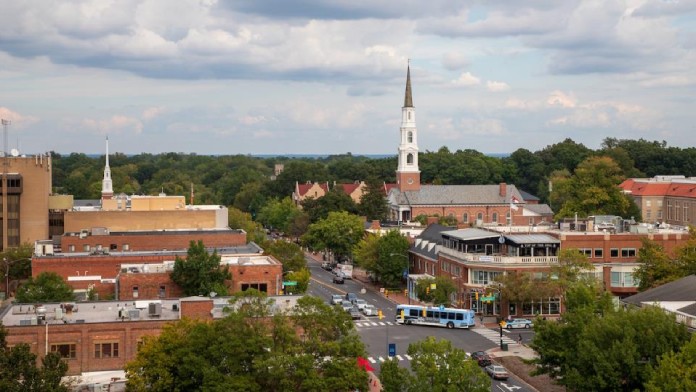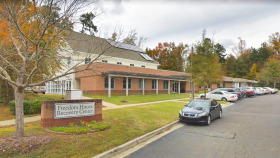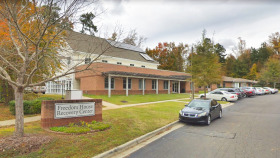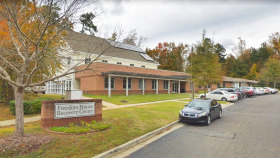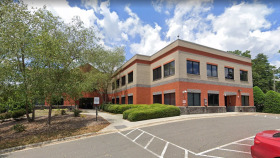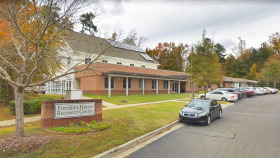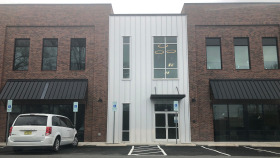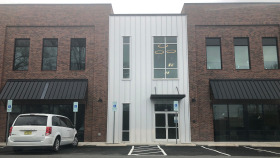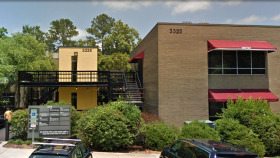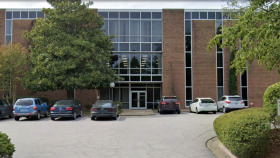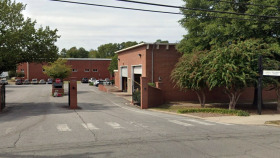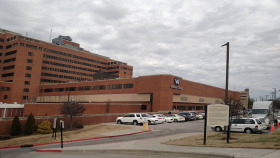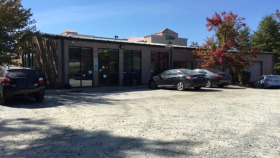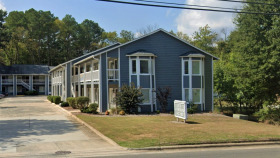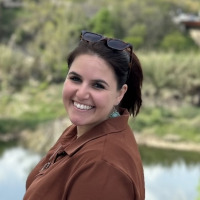Alcohol and Drug Use Statistics in Chapel Hill, NC
Let’s take a closer look at substance use in Chatham, Orange, and Durham Counties and how they’re affecting residents:1,2
The overdose emergency department visits for Orange County during this time averaged 81 visits per 100,000 people.
For Durham County, the overdose death rate for 2020 averaged 22 per 100,000 people.
The overdose emergency department visits for Durham during this time averaged 143 per 100,000 people.
Levels of Care for Addiction Treatment Settings
There are various types and settings of drug rehab, varying in structure and intensiveness.
Professional Detox
If you are dependent on alcohol or drugs like opioids, quitting can lead to uncomfortable withdrawal symptoms. Inpatient and outpatient detox can help manage your withdrawal symptoms and reduce the risk of relapsing to substance use.
Inpatient Care
Residential rehab is the most structured and intensive setting, providing a peace and serene environment to jumpstart your recovery, away from everyday stressors. You live at the treatment center during treatment and receive a variety of therapies and interventions.
Partial Hospitalization Programs (PHPs)
A step down from inpatient rehab, you attend several hours of treatment per day and return home during non-treatment hours (typically in the evening or nighttime). This is a great option for someone who needs a high level of care, but doesn’t want to stay overnight at a residential facility.
Intensive Outpatient Programs (IOPs)
Less intensive than PHP, an IOP involves several hours of therapy per week, often visiting the treatment center between three and five days each week. This is often used as a step-down option from inpatient or PHP. Some people’s first point of contact with substance misuse treatment may be an IOP, especially if their addiction is mild or if they want to continue working or attending school while recovering.
Standard Outpatient
The least intensive treatment option, standard outpatient, involves one to two hours of treatment per day for one or two days per week. This option has the least oversight and supervision, which increases the risk of relapse; however, highly motivated people with a strong support system may find this level beneficial.
Aftercare
Support doesn’t end once you complete your drug rehab program—it’s important to receive aftercare, which can provide you with ongoing support and encouragement in the form of 12-step groups, non-12-step groups like SMART Recovery, ongoing therapy, sober living homes, and more.
Financing Drug and Alcohol Rehab in North Carolina
If you are worried that you won’t be able to afford drug and alcohol rehab, check out these strategies for financing addiction treatment.
Private Insurance
If you have private health insurance through work or purchased from the Healthcare Marketplace, you can use it to cover the cost of drug and alcohol rehab, either partially or fully, depending on the treatment program you choose.
North Carolina Medicaid
North Carolina Medicaid is a government program providing health insurance coverage for low-income families and individuals. If you have Medicaid, you can use it to cover substance misuse treatment services, although you’ll want to make sure to find a rehab that accepts this form of payment.
Medicare
If you have North Carolina Medicare, you can use it to pay for the cost of drug and alcohol treatment services; however, you’ll want to make sure to find a facility that accepts Medicare.
TRICARE in North Carolina
North Carolina is in the East Region for TRICARE and provides coverage for drug and alcohol addiction treatment and rehab for military personnel, retirees, and their families.
Sliding Scale Rehabs
If you need financial assistance, you can seek out a sliding scale rehab, which charges a reduced price based on your income.
IHS-Funded Drug Rehabs
The Indian Health Service funds various alcohol and drug treatment centers that provide free care to Indigenous people with substance use disorders.
Everything You Need to Know About Visiting Chapel Hill, North Carolina

If you plan to visit someone receiving inpatient treatment at a drug or alcohol rehab in Chapel Hill or plan to receive outpatient treatment for yourself there, you’ll need to know what’s around and how to get around.
Here are some tips to get you started:
- The closest major airport to Chapel Hill is the Raleigh-Durham International Airport, located approximately 20 miles outside of the city.
- Chapel Hill is served by Chapel Hill Transit, which provides fare-free public transportation via bus. This transit service also connects through Carrboro and UNC.
- Other transportation options include ride shares such as park and ride, Lyft, Uber, and traditional taxis. You can also easily find rental cars and private car services if needed.
- While it’s possible to get around some areas on foot, Chapel Hill is not a very walkable city. You’ll need to arrange transportation if you’re planning activities outside of the area.
- There are also plenty of hotels, motels, bed and breakfasts, and Airbnb to suit all budgets when searching for lodging in or near Chapel Hill.
- Aside from visiting the University of North Carolina and the Carolina Basketball Museum, you can check out downtown for some shopping and dining out, visit the North Carolina Botanical Gardens, the Ackland Art Museum, and much more.
North Carolina Drug and Alcohol Laws
Below are some important North Carolina laws related to substance misuse:1
North Carolina Recovery Courts: Non-violent offenders can go to court-ordered drug rehab instead of serving jail time.
North Carolina Good Samaritan Overdose Law: Witnesses to overdoses can receive immunity from prosecution when they call 911 to save a person’s life.
Resources
- Chatham County Public Health Department. (2022, July). Illicit Substance and Prescription Drug Abuse.
- North Carolina Opioid Settlements. (n.d.). Data Dashboard: Opioid Indicators.

